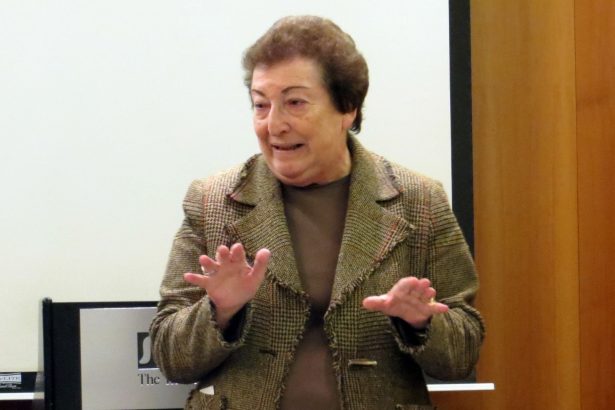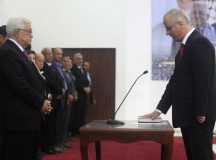On 20 March 2015, three days after the Israeli election, former Deputy Speaker of the Knesset Naomi Chazan made sense of the election results at a Fathom Forum in London.
These were heavily contested elections – they were unquestionably the most contested elections since 1999 – and the results show that. During the course of the election there was a lot of acrimony – very, very heated – there was a tremendous amount of engagement of civil society, which is not something we have seen in the past. To the wire, it was clear that we were talking about some form of a toss-up. I will contend that the polls weren’t wrong (in broad strokes).
The result of the Israeli election is a split in Israeli society and Israeli politics, just as anticipated. In terms of the ‘blocs’ – right, centre and left – the numbers are almost precisely as predicted. The difference is that the distribution within each bloc was different. Primarily, the distribution within the Right bloc was different. This allows Netanyahu to claim a major victory, although the Right actually shrunk a bit overall (also as predicted). The Left grew – substantially – for the first time since 1999 and the centre contracted a little bit.
Much of Israeli politics is about numbers and I want to do the calculations. The Likud did receive 30 seats, but it very clearly took these seats from three sources – from Naftali Bennett’s Jewish Home Party who went down from 12 to eight seats, from Avigdor Liberman who went down to six seats and from Shas who went down to seven. If you are looking for how Netanyahu in two or three days went from 24 seats to 30: it was by cannibalising his natural allies. Not only that, but the ultra-Orthodox went down: from 18 to 13 seats – they are smaller than they have been in years. If you put it all together: The Right and ultra-Orthodox come up to 57 seats – which is less than what they had before (and less than a majority). It was not a victory for the Israeli right, but it is victory for Prime Minister Netanyahu.
I think it is very important to make these distinctions, because we must be able to understand the political dynamic in the country.
Before the election, Labour and Hatnuah were on 21 seats and they are now on 24. Meretz – my party – lost a seat. The real significant new element in this election is the Joint Arab List, which garnered 13 seats – two more than all three Arab parties had in the outgoing Knesset – making it the third largest party in the Knesset. This is a political force that Israel has never known and it is going to have an amazing impact on parliamentary life in the future.
So, the Left went up while the Right and the ultra-Orthodox contracted.
In the centre we have two political parties – Yair Lapid’s Yesh Atid with 11 (down from 19) and Kulanu, Moshe Kahlon’s party. Kahlon is the kingmaker in this election with 10 seats. These parties are known in Hebrew as ‘balloon parties’, they come and go. There is a whole history of centrist parties who come and go, while the electorate of the centre is fairly solid at 20-25 per cent, who vote for whichever ‘balloon party’ takes off at that point.
Now, even today –I’ll put this in the strongest possible terms – if President Rivlin gets up and decides that he wants to give the task of forming the government to Herzog, he can form a government: on the assumption that he includes the Arab parties, which he could. The split between the Right and the Left is 57 to the Right, 53 to the Left. And the 10 votes of Mr Kahlon would have gone any way depending on who was the largest party. The success of Netanyahu is that he succeeded in upping the total number of votes for the Likud and therefore almost compelling the president to give him the first chance to form the government – it doesn’t mean that the Right won the election.
It is important for us to understand how the ‘magician’ Netanyahu succeeded in beating the polls. I’ll give four possible interpretations, each of which is worthy of discussion.
One interpretation is that Bibi is the master-campaigner in Israel and when he finally got into action he wielded his ‘magic’ and that is why he succeeded. He ‘blitzed’ every media outlet possible, was very aggressive, and Israelis supposedly love a strong figure. Herzog lacked charisma and wasn’t a real alternative. Therefore, when he got into action there was no alternative. I don’t like this interpretation, but it’s one of the reasons in the mix.
There is a second interpretation saying: ‘it’s not who says what’, but ‘what was said’. The ‘what was said’, especially in the three or four days before the election, was a mixture of fear and ‘Arab-Left mongering’: using terminology which hyped up the fear of what would happen should there be a change and using the fear factor as a campaigning tool. It wasn’t only fear, it was also statements like ‘do you want the Arabs and the Left (said together in the same breath) to control your destiny?’ And on the day of the election Netanyahu said that there are ‘droves’ of Arabs going to the polling stations; ‘go out and vote!’ Implicit, again, that if ‘you’ don’t go out and vote, the ‘Arabs and the Left’ are going to take over. This is an emotional explanation but a robust one – it reads the mood of Netanyahu’s electorate very well.
A third explanation is security; when it comes down to casting ones vote, Israelis (especially those with tendencies towards the Right) will ultimately vote for security and not their socio-economic situation. Therefore, there is almost an overlap between Netanyahu and security. It is uncalled for, because during the campaign almost the entire retired senior security personnel totally rejected his security analysis – but they could not undermine his representation as ‘Mr Security’. I wrote a piece about a month ago entitled ‘It’s the security, stupid’– indicating that there had to be an answer to this. There was, but I’m not sure it penetrated.
The fourth explanation – one I’m beginning to prefer – is that this was a case of identity politics. Netanyahu was able to decipher the Israeli electorate – especially those close to his position – and he played on the fact that these elections were not about anything concrete; they were about our identity as Jews (mostly – because he did not think about Arab citizens of Israel) and if ‘you’ really identify as Jewish ‘you have to vote for me.’
In a sense, he could do this because the Left made several major mistakes on its part, most notably the statement a week before the election by an artist (Yair Garbuz) essentially dumping on people who kiss Mezuzot, use charms, and the religious more broadly. Netanyahu said that if you felt offended by this statement, you have to vote for him, because he’s the Jewish leader who allows people to express their identity, against the ‘heathens’ of the Left and the Arabs; a subtle and intriguing use of identity politics.
All the explanations are somewhere along these four axes. The pollsters are in deep bereavement because they got it wrong, but that’s not really interesting. What is interesting is trying to understand what happened.
Implications
In broad political strokes the country is split. This split is now formalised more than it has been in the past, because of the even division between the blocs in the next Knesset and the shift in the balance of power within each bloc.
On the political alignment: there are fewer parties in this Knesset – 10 parties. The most important trend appears to be the solidification of blocs – which I expect we will see more and more of in the next few years. I anticipate – because of the rise in the threshold which created this situation – that certain parties will have to rethink their future; Meretz on the one hand, and Jewish Home on the other. The ideological parties suffered greatly and there are questions as to whether they can survive another election – I’m not sure.
On the Left, the Jewish-Arab cooperation has to be reconsidered. It is clear to everyone that without embracing the Arab party/parties – it is going to be very difficult.
Second, this Knesset is going to be so confrontational that I’m happy to be outside it. It will be confrontational because the difference between the coalition and the opposition is very small; I will qualify that: I’m not 100 per cent sure that Yair Lapid will not be tempted to enter the coalition (although he’d be very hard pressed to explain that to his electorate).
A lot of the conflict is going to centre on the Knesset; the first order of business is setting up committees. Now the Joint Arab List is the third largest in the Knesset and places on parliamentary committees are allotted by the size of the list. How many Arabs are going to be on the Foreign Affairs and Defence Committee? If they are not going to be there, then all hell is going to break loose.
Not only that, but there are some senior Likud MKs, who may or may not be ministers, who are going to try and implement what they could not in the outgoing Knesset on the matter of democracy, human rights and defining the state. For example, the proposed Nation State (the so called Jewish State) Bill – supposedly the straw that broke the camels back in the last Knesset – will come up again.
There will be attempts to rein in the judiciary, to rein in human and civil rights organisations legislatively. I can anticipate that much of the brouhaha will be at the parliamentary level and there will be much more homogeneity in the level of government. In the foreseeable future, the government will act together, with Bibi ruling the roost.
This government is going to – first and foremost – deal with socio-economic issues. Netanyahu owes this to his electorate, and in many respects this election was about socio-economic issues; the internal situation is very depressing, when we talk about housing, education, welfare, health – all of these issues will be upfront. I’m sure Israel is going to bore you to tears in the coming months because of the emphasis that is going to be put on these domestic issues.
He has the perfect person to do this in the form of Moshe Kahlon, who is right-wing and very socially committed – he’s the one minister whose post I can call – he will be the next minister of finance – he’s put a lot of emphasis on that.
External implications
Everybody knew that if Netanyahu was elected, it would increase the external pressure on Israel – it already has. There is nothing surprising about that. I would have loved to have heard the phone call between Netanyahu and Obama!
The message was clear. Netanyahu is not looking for a Palestinian state, no two-state solution etc – he said everything to get an extra vote from parties to the Right of the Likud and he succeeded!
But the patience of the international community has run out – it was clear that if Netanyahu was re-elected Israel would feel it. I don’t know what form this will take, but it’s going to happen. And there is going to be much less politeness vis-a-vis Israel. Having said that, Israel will become more isolated, I don’t dismiss the possibility of some kind of armed conflict – although I may add that Israelis have less patience for that then they have had in the past – and the Israeli-Palestinian conflict resolution is going to be totally internationalised.
Another internal implication is that, in the long run, whether Israel’s Arab citizens are integrated or alienated is going to shape the internal character of the state – and I expect strong repercussions in the Jewish communities of the world.





































It would make no difference to the “peace process” who is Israel’s PM. Palestinians have rejected solutions from both left (Ehud Barak), center (Ehud Olmert), right (Begin, Netanyahu).
The core issue in the conflict remains Arab refusal to accpet a permanent Israel behind any boundaries.
Ms Chazan is a bit economical with the truth.
1. The left didn’t grow , some centrists followed( I will go anywhere to get on the government) Livini there.
2. A bit rich calling Kahlon center, he is Ex Likud.
3. The rights vote did not shrink, other then points 1/2 above , the just failed to pass the threshold Yachad votes would have given the right 3 more mandates at the expense of the left, and in total voted would confirm the right – religious block as the dominant block in Israel, and its not shrinking either